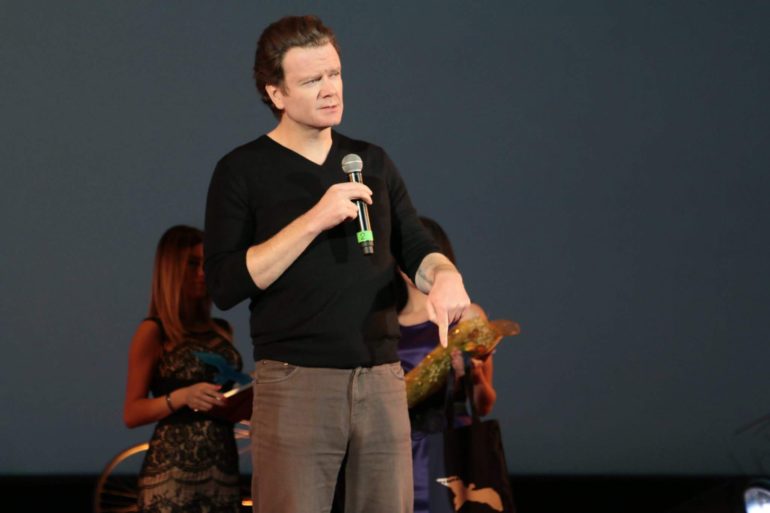Multi-award-winning Irish filmmaker Terry McMahon is set for an African adventure as he prepares to decamp to Nigeria for what African producers describe as “the biggest Nollywood movie project yet to come”, Caged In The Creeks.
McMahon has been invited to visit Africa’s most populous country, which produces more than 1,000 films a year, on a 10-day pre-production tour from October 20th where he will familiarise himself with the available equipment and film infrastructure in the country, as well as visits to Port Harcourt, Lagos, Ibadan, Rivers, and Abuja for the location recce.
McMahon has also been invited to meet top Nollywood actors to discuss on the cast of the movie and collaborations that could take place in the course of the production. He will work with some award-winning Nigerian filmmakers on the production of the crime drama, which is described as “a coming together of two different types of kidnapping in the Niger Delta region of the country.” It is also described as being about “cross-border misfits (terrorists and militants) who are knitted together in a relationship that is as devilishly targeting and discomforting as it is suffocating to all”.
Caged In The Creeks is being produced by Riveting Integrated Entertainment Limited (RIEL), a Nigerian production company with interests in film, theatre, music, TV, publishing, events promotion, artiste management and art distribution.
Scannain caught up with the filmmaker to ask him why he is bringing his talents to Africa.
In Ireland, there seem to be select filmmakers who get offered movies no matter what they do. Some of them can even make back-to-back duds and still secure finance for their next film. Then, there are the rest of us. People whose track record is also irrelevant. In a destructive way. The last film I directed won multiple awards internationally, and three IFTAs at home, yet there wasn’t a single offer to direct another film from anyone in Ireland. Not one. And believe me, I wasn’t sitting on my arrogant arse, waiting for handouts, I reached out to everyone. Nothing. Nada. I couldn’t even secure an unpaid apprenticeship on the television show Vikings.
For my third film, I desperately wanted to make a passion project, The Dancehall Bitch, a deeply provocative prison drama about the nature of coercion and sexual violence. The two leading actors of my previous films, Emmett Scanlan and Moe Dunford were as equally passionate about the project as I was. There was a kind of poetry in these two previously unknown actors, who are now trailblazing their way across the world stage, joining each other for our third film together. Also, in an era when the dangers of violent masculinity and the obscenity of coercive rape are two of the most contentious conversations in our culture, I also believed our timing couldn’t have been better. These were two superb young Irish actors who completely trusted their Irish director – all of whom had now proven themselves on that international stage – and we were ready to make a provocative picture about the national narrative like this country had never seen. What could possibly go wrong? Screen Ireland turned the project down.
The same happened with several other projects. Evidently, the kind of cinema I wanted to make was not the kind of cinema they wanted to make. The political landscape had changed. Certain films were taboo now. Just like certain directors. Paying the mortgage became an increasingly difficult task. I also had a new kid. Mouths to be fed. So, with twenty-five years of teaching experience, I applied to advertised positions in colleges. At the risk of sounding immodest, I had taught in several of these colleges in the past, consistently generating remarkable testimonials from the pupils. It may not have been filmmaking but facilitating students in finding their voices can still be incredibly creative. Then the penny dropped. I didn’t even make the shortlist for many of the interviews. Later it would be revealed that the positions had often gone to people significantly less qualified than me.
And that’s when you begin to get worried. Five years after Patrick’s Day won the Galway Film Fleadh and the Cork Film Festival, every filmmaker who had made the big films in those festivals that year had gone on to make another film. Sometimes two. Every filmmaker except the one who had won both festivals. In those five years, I had become increasingly involved in the politics of austerity and the sickening policies of our government. I had been asked to make some speeches. They caused serious backlash. I broke some cultural rules that are not meant to be broken. Apollo House didn’t help either. Everyone is equal in this new era of equality. Except for the ones who can’t swallow the lie. I was out. Finito. I would have killed to make my third film in Ireland. I adore our country. I adore Irish people. With a passion that’s almost embarrassing. Most of them, anyway. But telling the truth these days in Ireland is punishable by career death.
Yet, the Gods of Film are a gloriously fickle bunch. The audacity you are punished for in your own country can be the very thing that ignites the imagination of another. And no culture on earth embraces audacity more than Africa. They don’t care that you took some small action against the government’s murderous austerity. They admire it. They don’t care that you want to use film to shake up the world. They insist upon it. They don’t care that you’re a pink-skinned, black-listed Paddy who can’t keep his damned mouth shut. They love it. The only thing our African brothers really care about is whether or not you’ll put everything on the line to make a movie. And that’s the only thing I care about too. Which is why I love those magnificent men and women right back.
Terry McMahon, Filmmaker

